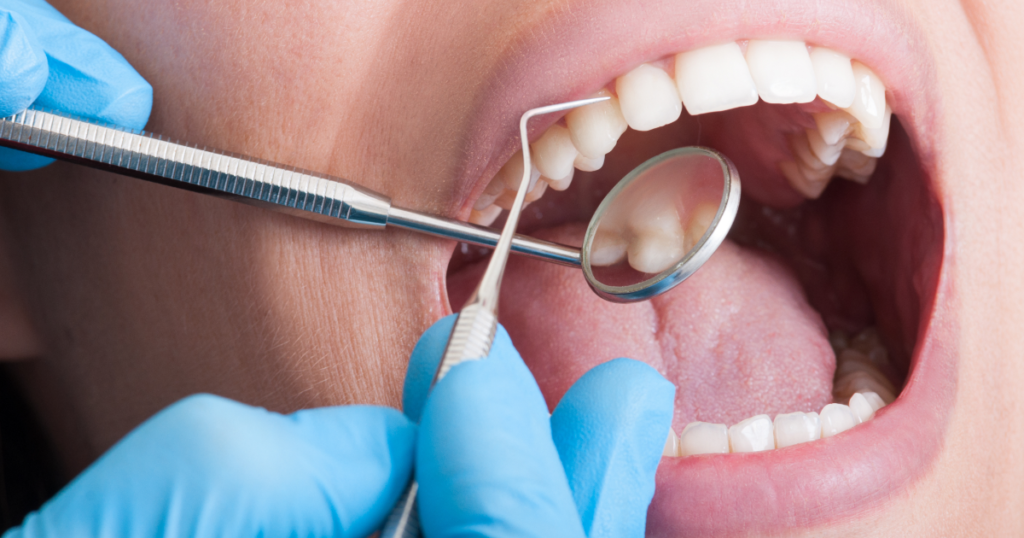Exploring Home Remedies and Causes of Toothache: Seeking Relief
If you’re experiencing a toothache, it’s important to seek professional dental care as soon as possible. However, some home remedies and tips can help alleviate the pain temporarily until you can see a dentist.
When it comes to an aching tooth, it’s essential to analyze and identify its root cause carefully. Understanding the potential sources of your discomfort will aid in determining the best course of action. Let’s explore some possibilities together.

Firstly, a broken tooth or a cracked tooth could cause you pain if you recently experienced trauma or injury to your mouth. The sharp edges or exposed nerves inside the damaged tooth can lead to sensitive teeth or sharp pain.
Secondly, a chipped tooth may also be responsible for your discomfort. Whether from biting into something too hard or accidentally hitting your mouth, a chip in the enamel can expose the delicate inner layers of your tooth, resulting in varying degrees of pain.
Additionally, toothache pain can arise from cavities, which occur when bacteria erode the protective layer of your tooth, known as enamel. As these harmful microorganisms penetrate deeper into the tooth, they can reach the nerve, triggering pain and sensitivity.
Lastly, missing fillings can also lead to tooth pain. Fillings are typically placed to repair decayed or damaged teeth. If an existing filling falls out, the underlying tooth structure becomes vulnerable, potentially causing pain or discomfort.
Prioritize Your Oral Health: Seek Timely Treatment for Tooth Pain
If you can’t determine the exact cause of your tooth pain, scheduling an appointment with a qualified dentist is crucial. They will conduct a thorough examination and may take X-rays to get a comprehensive view of your dental health. Based on their findings, they will provide a personalized treatment plan to alleviate your pain and restore your oral well-being.

Delaying treatment can have serious consequences and can potentially exacerbate the pain you are experiencing. It can also lead to further complications that may require more extensive treatment in the long run.
Furthermore, delayed treatment can result in potential damage to your oral health. For example, if a cavity is left untreated, it can continue to decay and eventually lead to the need for a root canal or even tooth extraction. Similarly, gum disease, if ignored, can progress to more advanced stages, causing significant damage to the supporting structures of your teeth.
In addition to the physical consequences, delaying treatment for tooth pain can also affect overall well-being. Tooth pain can be extremely uncomfortable and makes eating, speaking, and focusing on daily activities difficult. It can impact your quality of life and even affect your productivity at work or school.
Remember, your dentist is the best person to diagnose the cause of your tooth pain and recommend the most appropriate treatment. Delaying treatment can lead to unnecessary suffering and potentially more invasive and expensive procedures in the future. So, prioritize your oral health, seek timely treatment, and take control of your tooth pain to ensure a healthy smile for years to come.
7 Natural Home Remedies for Tooth Pain
Now we will discuss various home remedies to manage toothache symptoms and provide temporary relief. Remember, these remedies are not a substitute for professional dental treatment but can help you get by until your dental appointment.
1. Manage Swelling and Inflammation:
Tooth pain, a familiar and unwelcome sensation for many, often arises from inflammation in the gums or the delicate nerve of a tooth. Thankfully, there are simple measures one can undertake to alleviate the discomfort by targeting the swelling directly. One such approach involves using an ice pack or a cold compress, which can prove remarkably effective in reducing swelling and providing temporary relief.
When confronted with tooth pain, locating the affected area is prudent. Once identified, a cold compress or an ice pack can be applied gently to the external surface adjacent to the troublesome tooth or gums. The coldness of the compress or the ice pack serves as a powerful ally, as it works to constrict the blood vessels in the area. This constriction ultimately aids in diminishing the inflammation that is causing the pain and discomfort.
To administer this beneficial treatment, apply the cold compress or ice pack to the affected area for approximately 20 minutes at a time. During this period, it is important to exert only light pressure, allowing the coldness to penetrate the tissues without causing additional discomfort. After completing this 20-minute interval, taking a brief break of 20 minutes is advisable, allowing the area to gradually return to its normal temperature. Once the break has concluded, the process can be repeated, extending the application of cold therapy for as long as necessary.
By employing this strategy, one can effectively mitigate the swelling that accompanies tooth pain, thereby reducing the discomfort experienced. However, it is essential to bear in mind that this approach is not a long-term solution but rather a temporary remedy to provide respite. To address the underlying cause of the tooth pain and ensure lasting relief, it is crucial to seek the guidance of a dental professional who can diagnose and treat the root issue.
Additionally, taking ibuprofen (such as Advil) can help manage pain and reduce inflammation.
2. Hydrogen Peroxide Rinse:
Hydrogen peroxide, a common household compound, possesses properties that make it an effective antimicrobial agent. When it comes to alleviating tooth pain, hydrogen peroxide can be employed as a temporary solution. To create a suitable mixture, combining equal parts of hydrogen peroxide and water is recommended, resulting in a 50/50 solution.
To utilize this solution for oral care, one should begin by thoroughly rinsing the mouth with it for approximately 30 seconds. This allows the hydrogen peroxide to reach the affected area and potentially provide relief. Following this, it is important to spit out the solution and then rinse the mouth with fresh water. This final step ensures the removal of any residual peroxide, preventing any potential harm caused by extended exposure.
It is important to note that hydrogen peroxide should only be used occasionally to relieve tooth pain, not as a substitute for professional dental care. If tooth pain persists or worsens, it is essential to seek the guidance of a dental professional who can diagnose and address the underlying cause.
While hydrogen peroxide can temporarily relieve tooth pain, good oral hygiene practices such as regular brushing, flossing, and dental check-ups are essential for long-term oral health.
3. Saltwater Rinse:
A saltwater rinse can help alleviate toothache symptoms. Mix a teaspoon of salt in a glass of warm water. Rinse your mouth with the solution for several seconds, spit it out, and repeat until you’ve finished the entire glass. You can repeat this process as needed.

In dental care, incorporating a saltwater rinse into your routine is a highly effective technique for relieving toothache symptoms. Combine one teaspoon of common table salt to create this soothing concoction with a glass of comfortably warm water.
The method for application is straightforward – gently swirl the saltwater solution around your mouth for a few seconds, ensuring it reaches all areas of discomfort, and then expel the liquid. Repeat this process until you have rinsed your mouth with all the glass contents.
The beauty of this remedy lies in its adaptability. It allows you to repeat the process as frequently as necessary to achieve desired results. By integrating this straightforward and easily accessible technique into your dental care regimen, you can effectively alleviate toothache symptoms and restore comfort to your oral health.
4. Vanilla Extract:
While not suitable for drinking or rinsing, vanilla extract can be applied to sore teeth and gums using a cotton swab. Dab a few drops onto the affected area for temporary relief.
Furthermore, the soothing properties of vanilla extract can help alleviate discomfort caused by toothaches and gum sensitivity. When applied topically, the natural compounds in vanilla extract provide a numbing effect, reducing pain and inflammation. This temporary relief can be especially beneficial for individuals experiencing tooth or gum pain before seeking professional dental assistance.
It is important to note that while applying vanilla extract may offer temporary relief, it is not a substitute for proper dental care. Individuals experiencing tooth or gum pain should always consult with a dentist to address the underlying cause of their discomfort.
In addition to its potential use for oral pain relief, vanilla extract is a common ingredient in many dental products, such as mouthwashes and toothpaste. The pleasant aroma and taste of vanilla are often utilized to enhance the overall sensory experience of these oral care products.
Overall, vanilla extract can serve as a helpful, temporary remedy for soothing sore teeth and gums. However, for long-term oral health, it is crucial to prioritize regular dental check-ups and professional advice.
5. Clove Oil:
If you have clove oil at home, apply it to your sore gums or soak a cotton ball and hold it in your mouth. Clove oil is a truly remarkable substance that possesses inherent analgesic properties derived from nature.

The unique properties make it an excellent choice for pain relief. It works wonders in reducing discomfort and providing a much-needed respite.
One of the key advantages of clove oil is its natural origin. Derived from the buds of the evergreen clove tree, this substance has been used for centuries in traditional medicine practices. Its natural composition allows for a more holistic approach to pain management, making it an attractive option for those seeking alternative remedies.
The analgesic properties of clove oil are well-documented. Studies have shown it contains eugenol, a compound known for its pain-relieving effects. Eugenol acts as a local anesthetic by numbing the affected area, providing immediate relief. This makes clove oil especially useful for topical applications, as it can be easily applied to the skin or gums.
In addition to its analgesic effects, clove oil boasts other therapeutic properties. It has been recognized to hold anti-inflammatory properties and antiseptic qualities, making it a versatile solution for various ailments. Its ability to reduce inflammation and fight off infections further contributes to its overall efficacy as a natural pain reliever.
But once again, it is not a permanent solution for underlying issues. Consulting with dental services is always recommended for a proper diagnosis and guidance on long-term pain management.
6. Peppermint Tea Bags:
Tea bags, particularly peppermint tea bags, can help soothe sore gums and manage pain. Briefly soak a tea bag in warm water for a few seconds, then place it on the area of your mouth that hurts.
Tea bags, specifically peppermint tea bags, can be a valuable aid in alleviating discomfort and providing relief to individuals experiencing sore gums or oral pain. This simple and convenient remedy involves briefly immersing a tea bag in warm water, followed by applying the wet tea bag to the affected area in the mouth.
By utilizing this technique, individuals can harness the natural properties of peppermint tea, renowned for its soothing effects. Peppermint, known for its analgesic and anti-inflammatory properties, can also help reduce inflammation, ease pain, and promote comfort.
When employing this method, it is advisable to ensure that the water used for soaking the tea bag is comfortably warm, avoiding extremes in temperature to prevent further irritation. Moreover, it is important to carefully place the tea bag on the targeted area, securely applying gentle pressure to optimize the soothing benefits.
This approach can be particularly beneficial for individuals suffering from various dental issues, such as gum infections, toothaches, or post-dental procedure discomfort. The application of tea bags offers a natural and accessible alternative to over-the-counter painkillers or oral numbing gels, providing temporary relief while simultaneously delivering a refreshing and pleasant sensory experience.
7. Garlic:
Ancient healers used garlic, a humble culinary ingredient that harbors intriguing medicinal properties. While its pungent aroma may ward off vampires and social interactions alike, garlic’s potential benefits make it an enticing option for alleviating that sore spot in your mouth despite the inevitable temporary bad breath it may cause.

To employ this age-old remedy, start by obtaining a fresh clove of garlic, nature’s tiny powerhouse. Crush it delicately, releasing its potent compounds, including allicin, which harbors antimicrobial and anti-inflammatory properties. Directly applying this crushed garlic to the area causing you pain may offer a soothing effect.
However, it’s important to exercise caution and mindfulness during this process. If the sore spot in your mouth is too tender, gently holding the garlic against the affected tooth or in proximity to the pain may provide the desired relief without causing additional discomfort.
While the proposed mechanism of action behind garlic’s potential benefits for oral discomfort remains speculative, its antimicrobial properties may help combat harmful bacteria, reduce inflammation, and relieve the throbbing sensation that plagues you.
Conclusion:
In summary, it is important to remember that the home remedies discussed above are intended for temporary relief and should not be considered a substitute for professional dental care. While these remedies may help alleviate toothache symptoms, they do not address the underlying cause of the pain. Therefore, scheduling an appointment with a dentist as soon as possible is crucial to ensure proper diagnosis and treatment.
A dentist is a trained professional specializing in oral health and can provide the necessary expertise to identify and address the root cause of a toothache. They have the knowledge and resources to diagnose the problem and accurately develop an appropriate treatment plan. By seeking professional help, you can ensure that the underlying issue is resolved, preventing further complications and promoting long-term oral health.
Ignoring a toothache or relying solely on temporary home remedies can lead to more severe dental problems later on. In some cases, delaying treatment can exacerbate the issue and result in the need for invasive and costly procedures. It is always best to address dental problems promptly to avoid unnecessary pain, discomfort, and potential financial burden.
In addition to seeking professional dental care, it is crucial to maintain good oral hygiene practices. Regular brushing, flossing, and routine check-ups with a dentist can help prevent toothaches, tooth decay, and other dental issues. By taking proactive steps to prioritize oral health, you can minimize the likelihood of experiencing toothaches and ensure the longevity of your teeth.
Have you ever used any of these home remedies for tooth pain? What was your experience?
